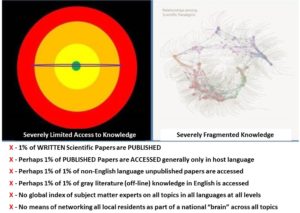
Rosenbach, Eric and Katherine Mansted . “The Geopolitics of Information.” Paper, Belfer Center for Science and International Affairs, Harvard Kennedy School, May 28, 2019.
- Information as a Source of Power
- The New Great Game
- Toward a National Information Strategy
 ROBERT STEELE: When I attended the SES/SIS knife & fork class at Harvard with Ken Minihan, among others circa 1987, I formed the impression that Harvard is simply not interested in new ideas (such as Open Source Intelligence) but rather in protecting its position as the town herald for old ideas, making cosmetic changes on the margins. My opinion has not changed as I have observed them over the years, most recently seeing the reports about a 60% drop in students checking out books while being ALLOWED by their professors to rely on online research known to be biased toward paid sources (Google shows you what they have been paid to show you, not what is relevant), while at the same time no one anywhere (Harvard included) is pointing out that we are processing 1% of what we collect, what we collect is 1% of what is published, what is published is 1% of what is written, and what is written in 1% of what is known. Talk about spray painting the naked Emperor with vapor-speak….
ROBERT STEELE: When I attended the SES/SIS knife & fork class at Harvard with Ken Minihan, among others circa 1987, I formed the impression that Harvard is simply not interested in new ideas (such as Open Source Intelligence) but rather in protecting its position as the town herald for old ideas, making cosmetic changes on the margins. My opinion has not changed as I have observed them over the years, most recently seeing the reports about a 60% drop in students checking out books while being ALLOWED by their professors to rely on online research known to be biased toward paid sources (Google shows you what they have been paid to show you, not what is relevant), while at the same time no one anywhere (Harvard included) is pointing out that we are processing 1% of what we collect, what we collect is 1% of what is published, what is published is 1% of what is written, and what is written in 1% of what is known. Talk about spray painting the naked Emperor with vapor-speak….
Having said that, this is a good write-up worthy of a full read. The authors may not be oblivious to the reality that the USA is a cheating culture operated by the Deep State and Shadow Government against the public interest in every possible way; they may not be oblivious to the fact that censorship in the USA is not only more powerful than censorship in China, but that Eric Schmidt is actually proud of having piloted digital censorship in the USA to the point that he could offer it China. Imagine that. Censorship “Made in the USA” attractive to communist China and other dictatorships. #GoogleGestapo.
The authors pay lip service to privacy and avoid the obvious, articulated so ably by Micah Sifry: the Internet is broken. To that I would add what Bill Binney and I have articulated, as well as others: the US secret intelligence community — and the US Government generally — are pathologically dysfunctional, rendering “at best” 4% of what the President and other major leaders need, and nothing at all for everyone else. We do not make evidence-based decisions, we make pay to play decisions for the 1% against the 99%.
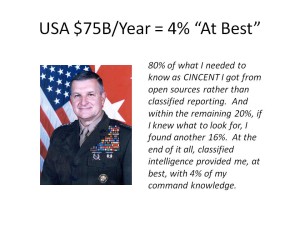
To understand Harvard [perhaps only the social science sycophantic side of Harvard) one needs to understand that they do not think, they just posture. They are a self-licking ice cream cone, an incestuous mini-cabal of self-citing circular “scholarship” that is not at all serious about studying points of view in English that are outside their very small circle of “approved” sources with a patina of “sanitized” iconoclasts, and they do nothing at all with foreign language sources particularly Chinese and Russian (and heaven forbid they get should a grip on Iranian or Turkish or even — dare I suggest this — French and Spanish). When SOCOM hired OSS Inc. and InfoSphere SA in 1997 to cover terrorism online, we determined that we must do so in 29 languages including Catalan and Gaelic. There is today no university, anywhere (nor any intelligence agency for that matter) that is committed to that kind of holistic comprehensive analytics.
In passing, Harvard is almost a quarter century behind me. Too little too late. We have wasted a quarter century. Time is the one strategic variable that cannot be replaced nor bought, so this is on the IC leaders, the OMB and White House leaders, the so-called university leaders. We blew it. The below cartoon that I paid for captures my view of Harvard as the apotheosis of intelligent idiocy that is decades late and not at all useful.
See Especially:
Steele, Robert. “Augmented Intelligence with Human-Machine Integrity: Future-Oriented Hybrid Governance Integrating Holistic Analytics, True Cost Economics, and Open Source Everything Engineering (OSEE),” in Daniel Araya. Augmented Intelligence: Smart Systems and the Future of Work and Learning. Bern, CH: Peter Lang Publishing., 2018.
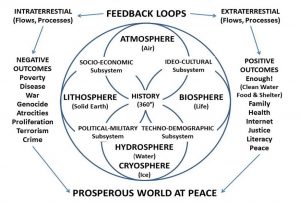
Steele, Robert. “Foreword,” in Stephen E. Arnold, CyberOSINT: Next Generation Information Access, Harrods Creek, KY: Arnold Information Technology, 2015.
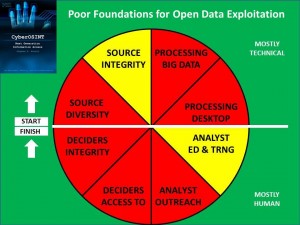
Steele, Robert with Hal Berghel. “Out of Band: Robert David Steele on OSINT,” IEEE Computer Vol. 47, No. 7, July 2014, pp. 76-81.
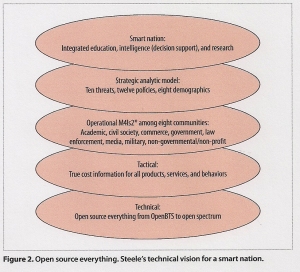
Steele, Robert. “The Evolving Craft of Intelligence,” in Robert Dover, Michael Goodman, and Claudia Hillebrand (eds.). Routledge Companion to Intelligence Studies, Oxford, UK: Routledge, July 31, 2013.
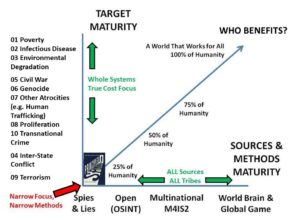
Steele, Robert. “The Ultimate Hack: Re-Inventing Intelligence to Re-Engineer Earth,” in U. K. Wiil (ed.), Counterterrorism and Open-Source Intelligence, Lecture Notes in Social Networks 2, Springer-Verlag/Wien, 2011.

Steele, Robert. “Open Source Intelligence (Strategic),” in Loch Johnson (ed.), Strategic Intelligence: The Intelligence Cycle, Westport, CT: Praeger, 2007, Chapter 6, pp. 96-122.
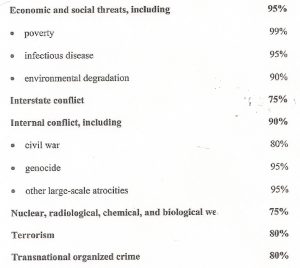
See Also:
1996
Steele, Robert. “SPECIAL FEATURE: Creating a Smart Nation–Strategy, Policy, Intelligence, and Information,” Government Information Quarterly, pp. 159-173
Steele, Robert. “Information Peacekeeping: Innovative Policy Options,” Proceedings, Fifth International Symposium on Global Security & Global Competitiveness: Open Source Solutions,” Vol II, pp. 255-267.
1995
Steele, Robert. “Reinventer Le Renseignement: Vision et Strategie / Reinventing Intelligence: The Vision and the Strategy,” International Defense & Technologies, December 1995.
Steele, Robert. “Private Enterprise Intelligence – Its Potential Contribution to National Security,” Intelligence and National Security, 10/4, October 1995, pp. 212-228.
1994
Steele, Robert. “Data Mining: Don’t Buy or Build Your Shovel Until You Know What You’re Digging Into,” Washington, DC: National Research Council, October 25, 1994, to the working group reviewing the US Army’s multi-billion-dollar future communications architecture.
Steele, Robert with James Anderson, William Caelli, and Winn Schwartau, “Correspondence, Sounding the Alarm on Cyber Security,” McLean, VA: Open Source Solutions, Inc., August 23, 1994.
1993
Steele, Robert. “National Intelligence and Open Source: From School House to White House,” American Intelligence Journal, Spring/Summer 1993, pp. 29-32.
Steele, Robert. “1993 Talking Points for the Director of Central Intelligence,” McLean, VA: Open Source Solutions Network, Inc., 20 July 1993.
Steele, Robert. “Testimony to Presidential Inter-Agency Task Force on National Security Information,” Washington, DC: Department of Justice, June 9, 1993.
Steele, Robert. “National Security and National Competitiveness,” Bulletin of the American Society of Information Science, February/March 1993, pp. 21-22
1992
Steele, Robert. “The National Security Act of 1992,” American Intelligence Journal, Winter 1992, pp. 32-37.
Steele, Robert. “Information Concepts & Doctrine for the Future,” McLean, VA: Proceedings of the First International Symposium on National Security & National Competitiveness: Open Source Solutions, 1 December 1992.
Steele, Robert. “E3i: Ethics, Ecology, Evolution, & Intelligence,” Whole Earth Review, Fall 1992, pp. 74-79.
1991
Steele, Robert. “Intelligence Support for Expeditionary Planners,” Marine Corps Gazette, September 1991, pp. 73-79.
Steele, Robert. “Applying the ‘New Paradigm’: How to Avoid Strategic Intelligence Failures in the Future,” American Intelligence Journal, Autumn 1991, pp. 43-46.
1990
Steele, Robert. “Intelligence in the 1990’s: Recasting National Security in a Changing World,” American Intelligence Journal, Summer/Fall 1990, pp. 29-36.
1989
Gray, Al (Ghost-Written by Robert Steele), “Global Intelligence Challenges in the 1990’s,” American Intelligence Journal, Winter 1989-1990, pp. 37-41.



